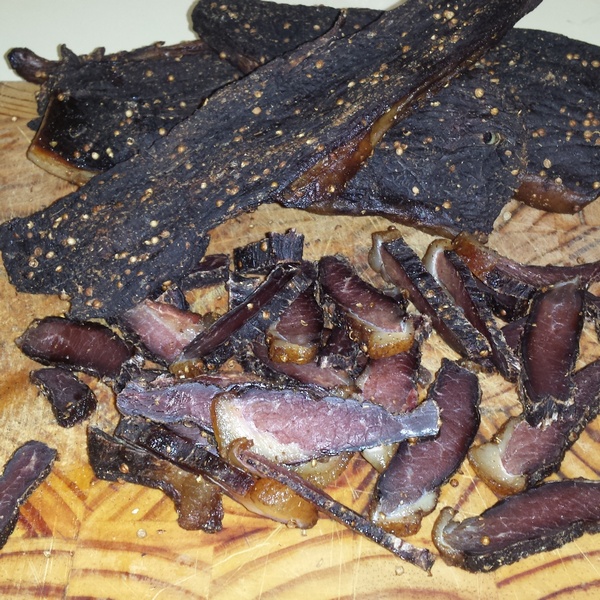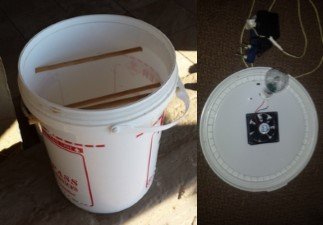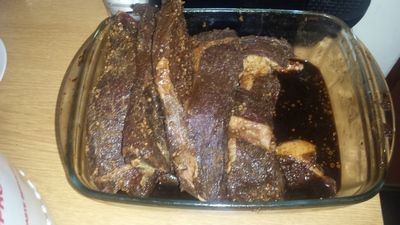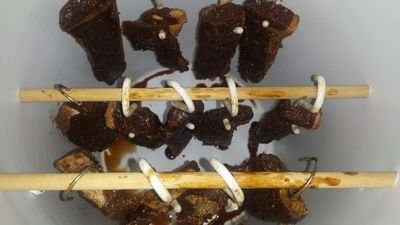DIY Biltong

Every South African knows what this is and most would agree that it is amazing. It is probably one of South Africa's most iconic snacks and can be found wherever South Africans are. The butchery in my town even exports to Hong Kong.
Let me start with a little background first. Wikipedia describes biltong as follows:
"Biltong is a form of dried, cured meat that originated in South Africa, Zimbabwe and Namibia. Various types of meat are used to produce it, ranging from beef and game meats to fillets of meat cut into strips following the grain of the muscle, or flat pieces sliced across the grain. It is related to beef jerky in that they are both spiced, dried meats, however the typical ingredients, taste and production processes differ; in particular the main difference is that Biltong is typically much less sweet than jerky."
It is unfortunately rather expensive to buy, with prices ranging from R180/kg ($14.00/kg) to R300/kg+ ($23/kg+). If you were to buy this in London you'll most likely pay double that!
It is fortunately not hard to make your own. The only tricky bit is getting the spice mix right but in South Africa at least, you can buy premixed spice.
First of all you need a dehydrator where your biltong will hang for a few days while the meat cures. These can be bought online on sites like Amazon.co.uk for £65 and Amazon.com has them for around $150. Yuppiechef.com sells them from around R400 in South Africa.
I didn't feel like spending all that money on one so I made my own out of a 20l plastic container, an old computer fan and a 60w lightbulb.

No one will ever accuse it of being pretty but it gets the job done every time! I have found that in summer when there are flies around I have to cover it with mosquito netting since you really don't want them laying eggs in your biltong. My next project is to cover the air holes with gauze to keep them out which will make things easier as the netting can be a pain.
Once you've got your equipment set up, the next step is to gather your supplies. The recipe below yields about 2kg of biltong depending on how wet or dry you like it.
You will need:
- 4kg beef (I usually get a big chunk of silverside but rump or sirloin works too)
- 100ml white spirit vinegar
- 100ml worcestershire sauce
- 120g salt
- 20g crushed black pepper
- 20g fine coriander
- 20g crushed coriander
- 20g paprika
- 2 teaspoons of sugar (This is optional. I find it makes the biltong too sweet for my taste so I usually leave it out)

Combine the vinegar, worcestershire sauce and spices in a jug and let rest while you cut the meat into 1cm thick strips.
How long you cut the strips is up to you but remember that they need to fit in the dehydrator without touching the bottom. Coat each strip with the spice mix and leave to rest overnight in the fridge.

The final step is to hang the biltong. If you bought a dehydrator they will have supplied you with hooks. If you went the DIY route you can buy them at certain shops in South Africa, or you can make your own out of wire. If you use wire just be careful as the hooks tend to rust after a few uses due to all the salt and moisture.
Now all that's left is to turn the dehydrator on and let the combination of airflow and heat do its job. You want to ensure a good airflow over the meat since this draws out the moisture and cures the meat. Stagnant air pockets are the enemy and can cause the meat to go rancid instead of curing. To avoid this make sure you don't overload your dehydrator. Rather make two smaller batches than trying to cram everything into one big batch.
Your biltong should be ready after three or four days. If you like wet biltong then it should be good after three days. You can judge how dry it is by squeezing the meat. If it feels soft then it's still wet. The harder it feels the drier it will be. I usually just take a piece out on day three and test it. If the inside is still light in colour then you need to give it more time. Once it turns darker it is ready to eat, although it will still be "wet" biltong. If you like it bone dry then leave it to hang another couple of days until it's very dark all the way through. Be warned though that it will be tough as old boots and hard to cut. I once had giraffe biltong that was so hard my jaw was sore after eating!
There you go. Homemade biltong within a few days with minimal hassle. I've found that the price per kilogram is a bit less than the lower end of what I've found in shops. It will obviously vary depending on the price of your meat as that's the biggest expense. I suggest you play around with the spice mix until you find the balance that suits your taste.
Thank you for reading and all the best in your biltong making adventures!
Just a quick disclaimer and advice on food safety. Obviously you are responsible for making sure that your equipment is clean and that you make sure that flies or other contaminants don't spoil your meat while it cures. You should make 100% sure that your dehydrator is sealed against flies as they can lay eggs in a split second which will lead to maggoty meat within a few days. That being said, I've never had any problems when following the steps described above.
Congratulations @rahvin84! You have completed some achievement on Steemit and have been rewarded with new badge(s) :
Click on any badge to view your own Board of Honor on SteemitBoard.
For more information about SteemitBoard, click here
If you no longer want to receive notifications, reply to this comment with the word
STOPBesides the mining stuff im really impressed at your tenacity at making your own chow . Checked out your blog and read about the butter and cheese and now biltong. As a fellow south african im glad you trying to spread the love of this lovely snack .
Thanks man! We gotta spread the word. Biltong must take over the world!